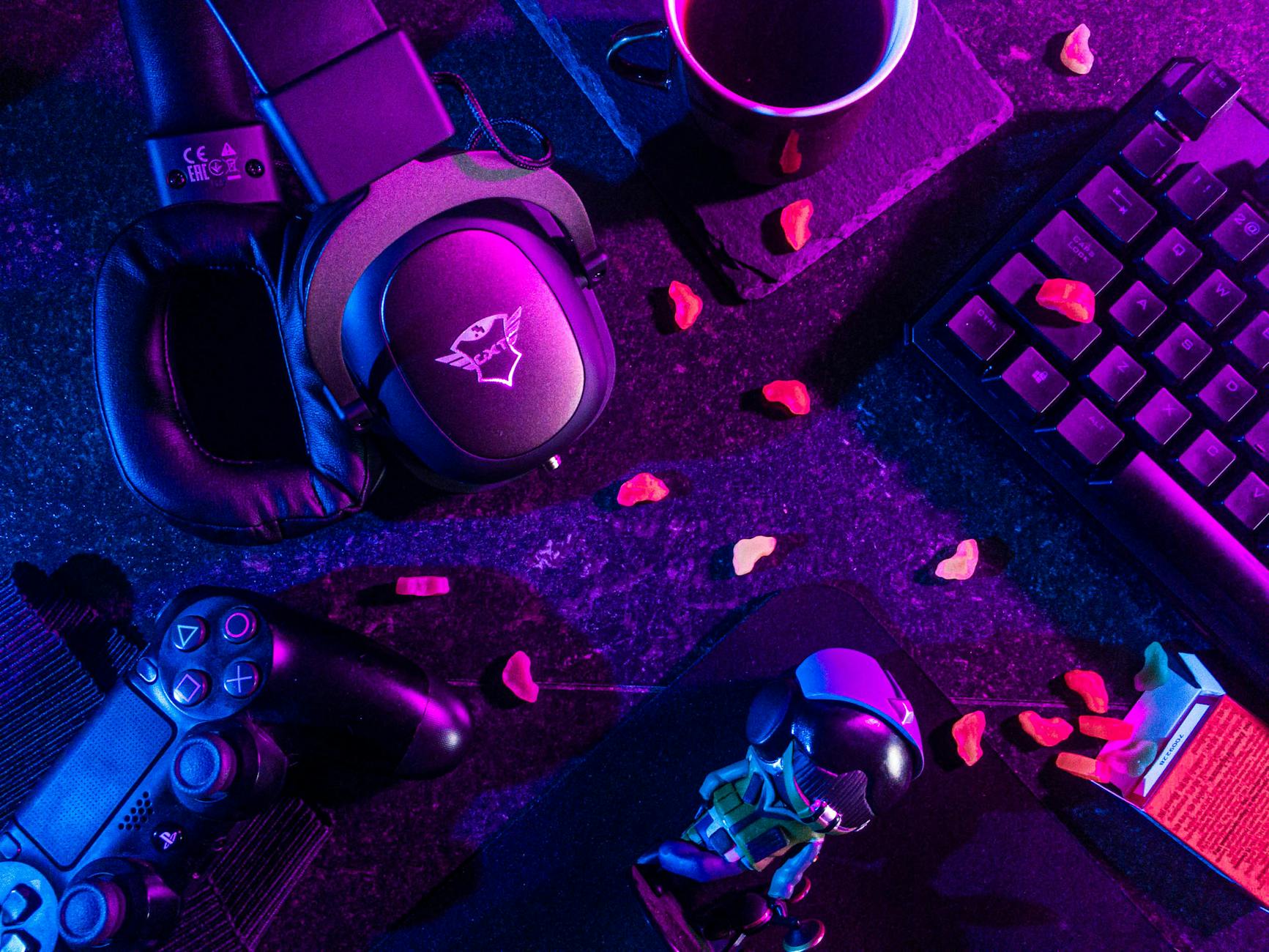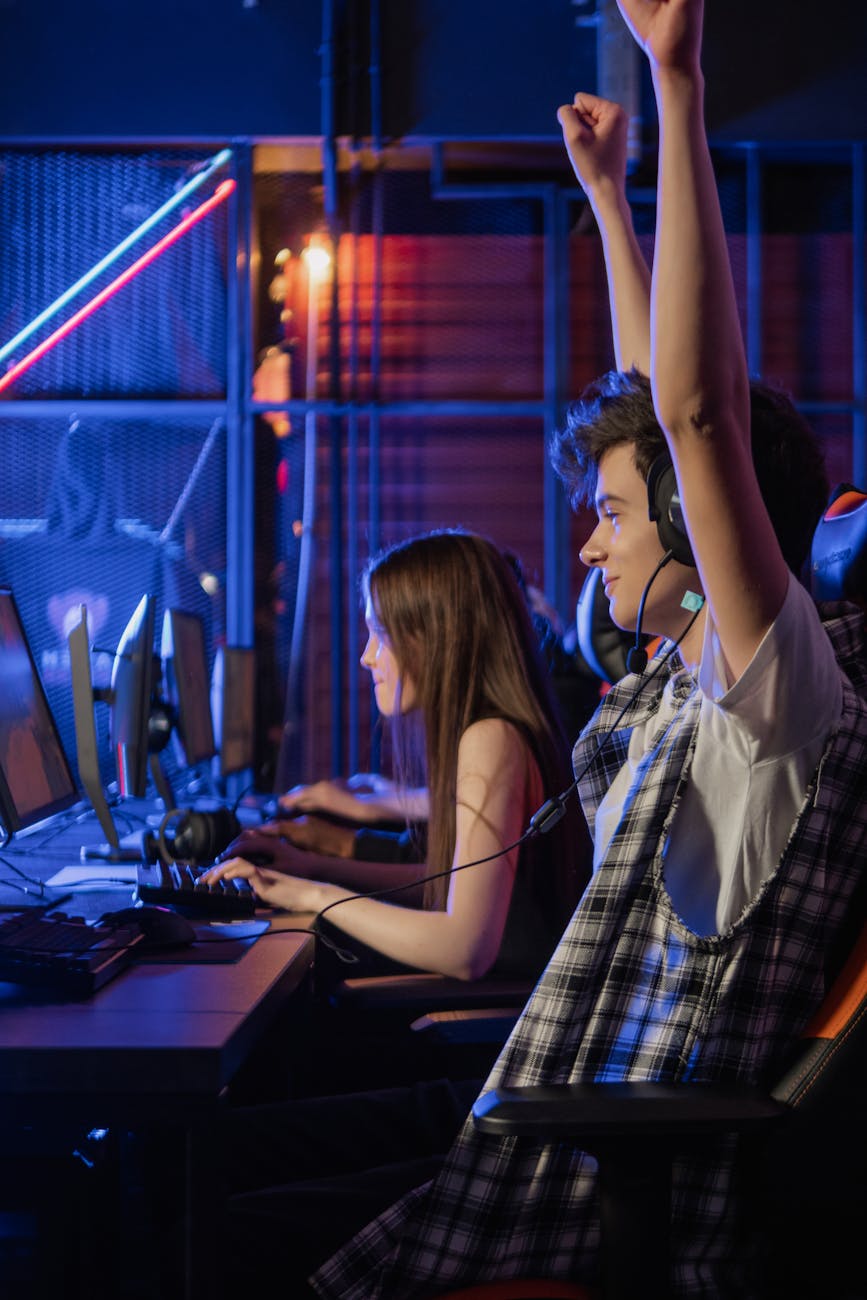Why Late-Night Gaming Impacts Your Sleep Cycle
Staying up for “just one more round” may seem harmless, but have you ever wondered why those late-night gaming sessions leave you feeling like a zombie the next day? It’s not just the adrenaline of clutching that last victory—your sleep cycle takes a hit, too. Let’s explore why gaming into the wee hours messes with your rest and what you can do to game smarter without sacrificing your shut-eye.
Blue Light: The Sneaky Villain Sabotaging Your Sleep
Your favorite games might have stunning visuals, but all those vibrant graphics come with a hidden downside: blue light. Screens—whether it’s your gaming monitor, TV, or handheld device—emit blue light, which tricks your brain into thinking it’s still daytime. This happens because blue light suppresses melatonin, the hormone that signals your body to wind down and sleep.
When you’re gaming late at night, your body doesn’t get the message that it’s bedtime. Instead, your brain stays in go-mode, alert and ready for action. It’s like sending your brain into a boss fight without giving it time to recover from the last level. No wonder you feel restless when you finally crawl into bed!
Pro tip: Blue light blocking glasses can help reduce the impact, allowing your brain to relax even if you’re gaming after dark.
Adrenaline Overload: Gaming’s Double-Edged Sword
Late-night gaming isn’t just about the screens—it’s also about the thrill. Whether you’re dodging enemies, scoring goals, or building epic fortresses, gaming is designed to keep you engaged. That rush of adrenaline when you clutch a win or escape defeat? It’s great for gaming but terrible for winding down.
Your body naturally produces stress hormones like cortisol when you’re hyped up, and those hormones don’t magically disappear when you turn off the game. Instead, they linger, keeping your heart racing and your mind replaying the action. You might find yourself lying in bed, thinking about that one move you should’ve made or strategizing for tomorrow’s matches.
The solution? Try setting a gaming curfew. Give yourself at least 30 minutes to cool down before hitting the hay. Spend that time stretching, reading, or sipping some calming tea—anything to help your body shift gears.
Irregular Sleep Patterns: A Gamer’s Kryptonite
Let’s face it: gaming late at night often leads to irregular sleep patterns. One night, you’re up until 2 a.m. defeating bosses; the next, you’re crashing early to make up for it. This inconsistency confuses your internal clock, or circadian rhythm, which thrives on routine.
When your sleep schedule is out of sync, it’s not just your gaming performance that suffers—your whole day feels off. You might wake up groggy, have trouble focusing, and even feel moodier. And let’s be real, no one likes a cranky teammate!
One way to combat this is by sticking to a consistent bedtime, even on weekends. We know—it’s tough to log off when you’re on a roll, but your future self will thank you. And if you absolutely have to stay up late, prioritize sleep the following night to reset your rhythm.
The Importance of Lighting Setups for Eye Comfort
If you’ve ever felt your eyes scream “enough!” after hours of gaming or work, chances are your lighting setup is to blame. Poor lighting isn’t just annoying—it’s a silent saboteur of your focus, comfort, and even long-term eye health. Let’s explore how the right lighting can save your eyes from fatigue and keep you gaming like a champ.
Why Your Room Lighting Sets the Mood (and Saves Your Eyes)
Ever noticed how squinting becomes your default when the lights are too dim or too bright? Your eyes are working overtime! Proper room lighting is about balance. Too much brightness? Your screen glares like the sun, forcing your eyes to strain. Too little? Your eyes strain to adjust, leading to fatigue faster than you can say “game over.”
A good rule of thumb is to match your room’s light level to your screen’s brightness. Soft, ambient lighting works wonders, especially if it’s placed behind or around your screen. Try using LED strip lights or a dimmable desk lamp to create a cozy glow without overwhelming your eyes. Bonus: it makes your gaming setup look cooler, too!
Screen Glares Are the Ultimate Boss Fight
Glares aren’t just irritating—they’re enemy number one when it comes to eye strain. A poorly placed light source, like a bulb shining directly on your screen, creates harsh reflections that your eyes constantly have to adjust for. It’s like fighting a boss fight you didn’t sign up for.
To avoid this, position your light sources so they don’t bounce off your screen. Desk lamps with adjustable arms are perfect for this, letting you direct the light where it’s needed without creating those dreaded glares. Natural light is a great ally, too—just make sure your desk isn’t in direct sunlight, or you’ll be squinting harder than ever.
The Secret Weapon: Task Lighting
If you’re still relying on overhead lights alone, you’re missing out on the MVP of lighting setups: task lighting. Overhead lights are fine for general illumination, but they’re not designed for focused activities like gaming or working. Task lights, on the other hand, provide localized, adjustable light where you need it most.
A well-placed task light reduces shadows, improves contrast, and gives your eyes a break. Want to level up? Get one with adjustable color temperatures. Warmer tones are easier on your eyes during evening sessions, while cooler tones can help you stay alert during the day. Trust us, your eyes will thank you!
The Blue Light Factor: Don’t Forget Your Screen Settings
Even with the perfect lighting setup, your screen could still be the culprit. Blue light from screens doesn’t mix well with your eyes, especially at night. Consider tweaking your screen settings to reduce blue light emission—most devices have a “night mode” or “eye comfort” setting that warms up the colors.
Combine this with your killer lighting setup, and you’ve got a one-two punch for better eye comfort. If you’re still struggling with screen fatigue, blue light blocking glasses are another option worth exploring. Think of them as a shield for your eyes during long gaming marathons.

How Blue Light Glasses Can Improve Nighttime Focus
Ever felt your concentration fade after staring at a screen all evening? It’s not your gaming skills—blue light could be the culprit. Blue light blocking glasses are a simple yet game-changing tool for anyone looking to stay sharp during nighttime sessions. Here’s how they help you keep your focus when it matters most.
The Invisible Enemy: Why Blue Light Wrecks Your Focus
You’ve probably heard about blue light disrupting your sleep, but did you know it also messes with your ability to focus? Blue light suppresses melatonin, the hormone that helps regulate your sleep-wake cycle. While this might not seem like a big deal at first, over time, it leaves you feeling sluggish and unfocused.
Imagine trying to level up in your favorite game or finish that last task for work while your brain fights exhaustion. Blue light makes your eyes work harder, leading to fatigue that sneaks up on you. By the time you realize it, you’re squinting at the screen, and your A-game feels a million miles away.
How Blue Light Glasses Step Up Your Game
Here’s where blue light glasses come to the rescue. These nifty lenses filter out harmful blue light, reducing eye strain and helping you maintain clarity. Whether you’re battling bosses in a fantasy world or crunching numbers for a report, your focus stays sharp when your eyes aren’t struggling to keep up.
Wearing blue light glasses during nighttime gaming or work sessions creates a more comfortable visual experience. They don’t just protect your eyes—they let your brain stay in the zone longer. Less strain means less distraction, so you can power through those epic quests or late-night deadlines like a champ.
Sharper Focus, Better Gameplay (or Workday)
Ever noticed how your eyes feel tired faster at night? That’s not just the hours adding up—it’s the impact of artificial light. Blue light glasses minimize glare and improve contrast, making on-screen details crisper and easier to see. For gamers, this translates to quicker reaction times and better precision.
If you’re not a gamer, don’t worry—these benefits apply to anyone glued to a screen. Coding, designing, or even watching your favorite streamer becomes a much smoother experience. When your eyes are relaxed, your brain can give 100% to what you’re doing, no distractions.
The Nighttime Focus Formula
Let’s talk science for a second. Blue light glasses work by filtering out short-wavelength light, which is the most disruptive to your brain. Without that constant blue glare, your eyes and mind can relax into a more natural rhythm. This means you’ll feel alert and focused, even during those late-night grind sessions.
Pair these glasses with smart habits like adjusting your screen’s brightness and setting up proper lighting, and you’ve got a winning formula. Blue light glasses amplify these small changes, making a noticeable difference in how long and how well you can concentrate.
More Than Just Focus: The Sleep Connection
When you’re focused, you’re not just getting more done—you’re setting yourself up for better rest, too. By blocking blue light, these glasses let your melatonin production bounce back faster. You’ll feel more relaxed when it’s finally time to log off, making it easier to transition from productivity to dreamland.
A good night’s sleep means waking up refreshed and ready to take on another day of gaming, working, or whatever fuels your passion. Blue light glasses don’t just help you focus—they set the stage for better health and performance overall.
Sleep-Friendly Snacks and Hydration for Better Gaming Stamina
Your gaming performance isn’t just about skills and gear—it’s also about what you fuel your body with. Choosing the right snacks and staying properly hydrated can make a big difference in how long you can stay focused and alert. Let’s dive into some tasty and healthy tips to boost your gaming stamina without sacrificing sleep.
Snack Smart: Fuel Your Gaming Without the Crash
We’ve all been there—grabbing a bag of crisps or a sugary soda during an intense gaming session. While these might give you a quick energy boost, they often leave you feeling sluggish and unfocused after the initial high wears off.
Instead, opt for snacks that provide sustained energy. Think nuts, seeds, and whole-grain crackers—they’re rich in complex carbs and healthy fats. These foods release energy slowly, keeping you fueled for hours without the dreaded crash. Want something sweet? Go for fresh fruits like bananas or berries. They satisfy your cravings and give you a natural energy kick.
Power Up with Protein for Long-Lasting Energy
If you want to keep your reactions sharp and your stamina high, protein is your best friend. Snacks like Greek yoghurt, hard-boiled eggs, or a handful of almonds can work wonders for keeping hunger at bay and your focus intact.
Protein helps stabilize your blood sugar levels, meaning you won’t experience the spikes and dips that sugary snacks can cause. Plus, it keeps you feeling fuller for longer, so you can stay locked into your game instead of constantly raiding the kitchen.
Hydration: The Unsung Hero of Gaming Stamina
You might not think much about what you’re drinking while gaming, but hydration plays a huge role in your performance. Even slight dehydration can lead to fatigue, slower reaction times, and difficulty concentrating—all of which can ruin your chances of victory.
Water should always be your go-to, but if you want some flavor, try herbal teas or water infused with fruits like lemon or cucumber. Avoid energy drinks or caffeinated sodas late at night. While they might seem like a gamer’s best friend, they can disrupt your sleep and leave you jittery when you need to wind down.
Sleep-Friendly Snacks: Keep Your Zzzs in Check
Late-night snacking doesn’t have to mess with your sleep. Certain foods can even help you relax and prepare for better rest. For example, foods rich in tryptophan—like turkey slices, nuts, and yoghurt—encourage the production of serotonin, a chemical that helps regulate sleep.
If you’re in the mood for something warm, a small bowl of porridge or a cup of chamomile tea can work wonders. These snacks are light enough not to disturb your sleep but satisfying enough to curb hunger during those marathon sessions.
Balance is Key: Avoid Overeating While Gaming
It’s easy to lose track of how much you’re eating when you’re focused on the screen. Portion control is crucial to avoid feeling sluggish. Use small bowls or plates to measure out snacks instead of mindlessly munching from the bag.
Also, take short breaks to assess your hunger levels. Sometimes, the act of stepping away from the screen for a minute can help you realize you’re not as hungry as you thought—you just needed a quick breather.
Plan Ahead for Better Choices
One of the best ways to ensure you’re making healthy choices is to plan your snacks and drinks ahead of time. Keep a stash of healthy options like mixed nuts, dried fruit, or granola bars within reach, so you’re not tempted by junk food.
Fill up a water bottle before your session starts and make it a goal to finish it by the end of the game. These small steps can make a big difference in your energy and focus levels.


